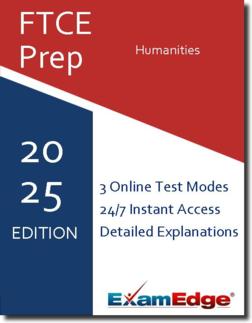FTCE Humanities (022) Practice Tests & Test Prep by Exam Edge - Topics
Based on 34 Reviews
- Real Exam Simulation: Timed questions and matching content build comfort for your FTCE Humanities test day.
- Instant, 24/7 Access: Web-based FTCE Humanities K-12 practice exams with no software needed.
- Clear Explanations: Step-by-step answers and explanations for your FTCE exam to strengthen understanding.
- Boosted Confidence: Reduces anxiety and improves test-taking skills to ace your FTCE Humanities K-12 (022).

Understanding the exact breakdown of the FTCE Humanities K-12 test will help you know what to expect and how to most effectively prepare. The FTCE Humanities K-12 has 100 multiple-choice questions The exam will be broken down into the sections below:
| FTCE Humanities K-12 Exam Blueprint | ||
|---|---|---|
| Domain Name | % | Number of Questions |
| Knowledge of the vocabulary and concepts basic to the humanities | 15% | 15 |
| Knowledge of historical periods, styles, and movements | 28% | 28 |
| Knowledge of the interrelatedness of arts and ideas | 17% | 17 |
| Knowledge of the relationship between a culture's beliefs and values and their expression in the humanities |
26% | 26 |
| Knowledge of prominent aesthetic principles used by major cultures in evaluating the arts |
7% | 7 |
| Knowledge of instructional techniques, assessment, and resources appropriate to the humanities |
7% | 7 |


